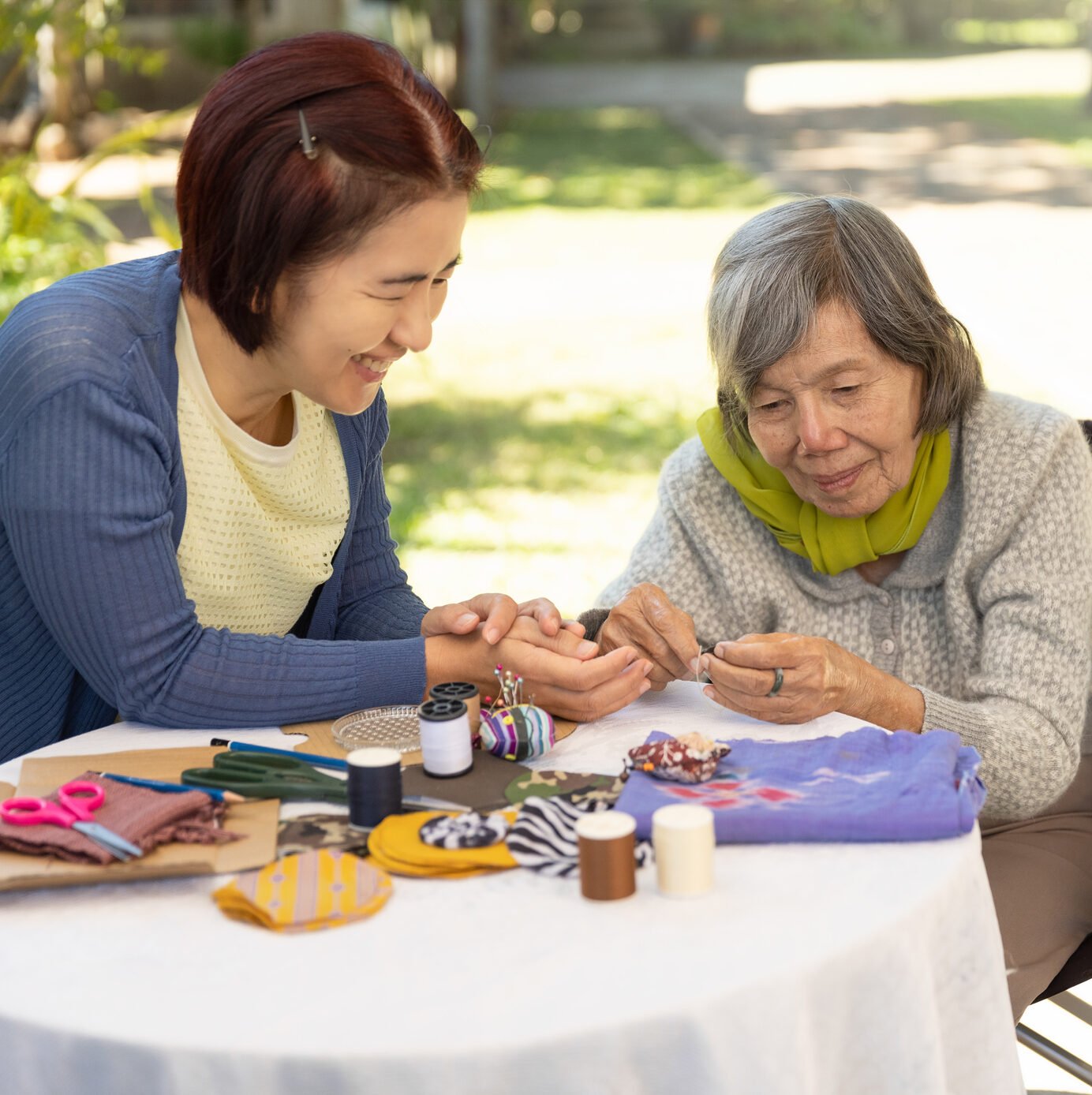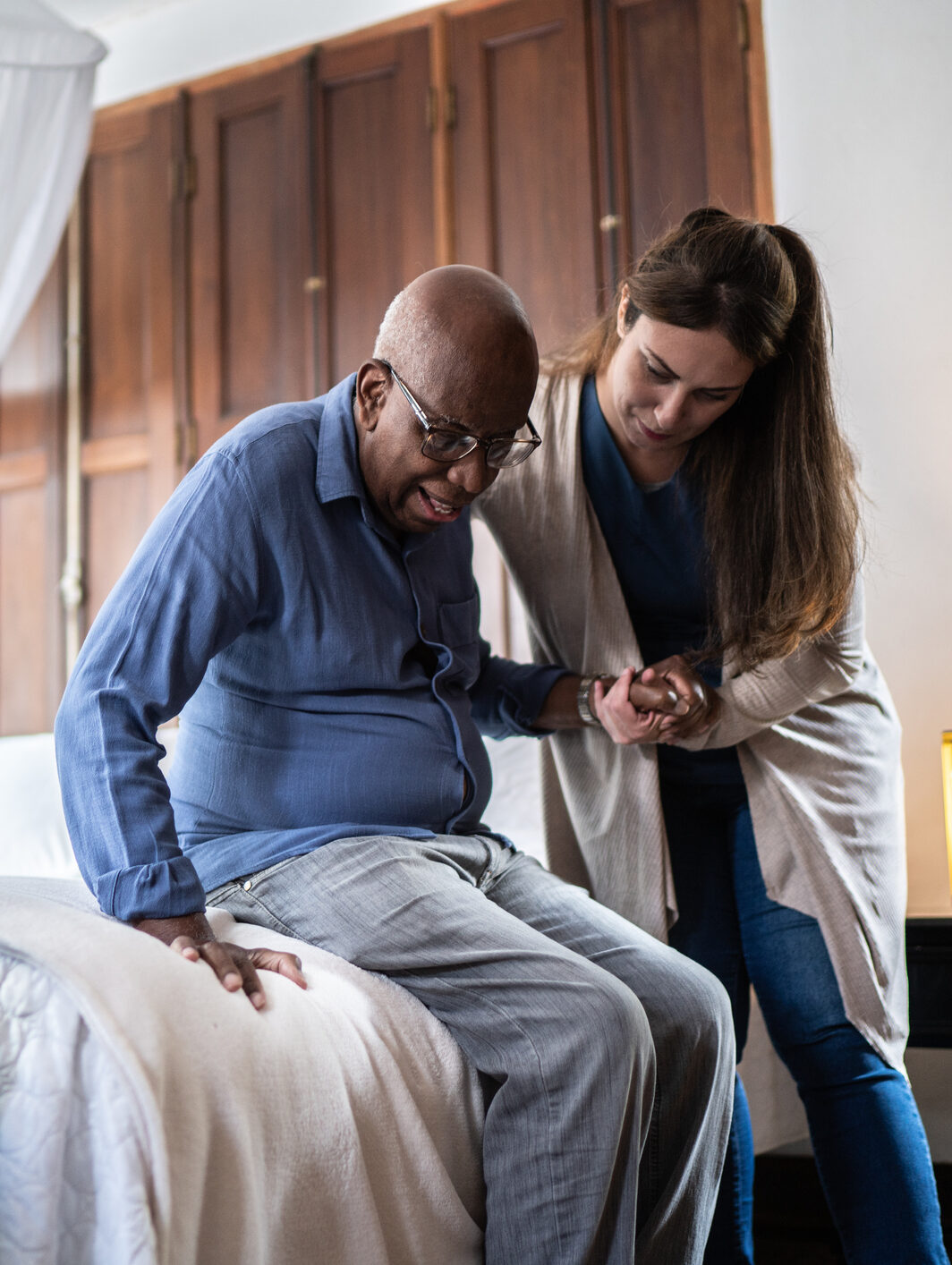People often ask me what assisted living communities “can and cannot do”. In this article I will address 13 of their most pressing questions and concerns:
- What is the range of services assisted living provides for seniors as they age in place?
- What types of needs require a higher level of care that an assisted living community cannot provide?
- Is assisted living just an interim step to a nursing home?
- Will my loved one be able to stay in their assisted living home receiving additional services if their health declines, even through the end of their life?
I am happy to let you know, most importantly:
- Most often assisted living is NOT an interim step to a nursing home
- Most assisted living residents are able to stay in their new home for a very long time even through the end of life. They receive services to meet their increased needs, provided by assisted living staff, visiting nurse agencies, or privately paid home health aides and companions.
Answers to the top-asked questions about Assisted Living services
The services that a specific assisted living community can provide depends upon what state it is located in. Some state regulations allow assisted living communities to provide a wide variety of skilled nursing and other enhanced services, while others do not allow skilled nursing services at all. This article will cover all of this and more.
My company, Senior Living Residences, manages assisted living communities in New England, specifically MA, CT and NH. My answers reflect differences in regulations between these states. If you are located in a different state, be sure to ask these specific questions when you are researching assisted living for your loved one.
No matter where you live, you might be surprised at how many people can live in assisted living – those who are in wheelchairs, those who need special diets, those who need help managing a complex medication regimen, those coming out of the hospital who need individual attention and personal care, and those with memory loss.
[Assisted Living Resident Profile]
1. Does assisted living provide help with dressing and showering?
Yes. Assisted living communities provide lots of personal care services for older people. In fact, most residents need assistance with everyday activities, such as 72% with bathing and 50% with dressing. Many older people have arthritis and stiff joints making it difficult for them to button shirts, lean over to get their shoes on, pull sweaters over their heads, and even comb their hair. Resident Care Associates help them with all of this.
It’s a nice way for older people to get up and ready for their day, knowing they look their best. They also get personal assistance getting ready for bed at the end of their day, and any other time, day and night, when needed. Resident Care Associates in our communities, and most others, are trained Certified Home Health Aides (CHHA) or Certified Nursing Assistants (CNA).
2. Can my Mom get help managing her medications in an assisted living community?
spitalizations in the elderly. Therefore, assistance with medication management is critically important in keeping older people healthy.
All assisted living communities offer a medication management service. In many states residents take their own medications, with reminders and observation by the assisted living staff to make sure they are taking the right dose at the right time. Residents who can’t take their medications themselves, such as those who have dementia or those who need their pills crushed, can also be accommodated in assisted living through nurse administration of medications. In some states, including our community in NH, specialized medication technicians on staff support residents with medication needs.
3. Can meals in an assisted living community be tailored to a resident’s specific dietary needs, restrictions, or special requests?

Yes. Assisted living communities can accommodate older adults who need special diets to manage hypertension, diabetes and other chronic conditions. Daily menus offer options for diabetic and low salt meals for all residents. Some assisted living communities, including the ones we manage, offer pureed foods for aging adults who have difficulty swallowing (referred to as “mechanically altered diets”), with an order from their physician. Many communities accommodate specific requests for gluten-free and vegan foods, as well as vegetarian and kosher meals. Some communities also offer a selection of brain healthy foods based on the delicious and well documented Mediterranean Diet that has been proven to boost overall body and brain health. Our Brain Healthy Cooking program is very popular with our residents.
4. My Dad uses a wheelchair. Can he live in an assisted living community?
Yes. It’s just about an even split between assisted living residents who can walk unassisted, and those who use walkers and wheelchairs.
Assisted living staff are also able to provide assistance to people who need help getting out of their wheelchair to use the toilet or get in and out of bed. This service is called “transferring”. There is a wide range of transfer/lift devices that staff use, from sit-to-stand support to high levels of devices, such as a hoyer lift. The level of “transfer support” that an assisted living community can offer varies depending on specific state regulations and the individual community. Be sure to ask about this when you tour assisted living communities.
5. My Dad has multiple chronic conditions, including high blood pressure, arthritis and kidney disease. Can he live in assisted living?

Yes. Someone who has chronic medical conditions that need to be monitored and managed regularly can live in assisted living, sometimes with outside agency help. In fact, the majority of assisted living residents (75%+) have at least several of the top 10 chronic conditions impacting the elderly: 52% have high blood pressure; 42% have arthritis; and 34% have heart disease. Other top 10 conditions include: osteoporosis, diabetes, COPD, cancer, stroke and depression.
If the person’s conditions are well managed with medications, the resident may be placed on a medication management program. This ensures that they take their medications as prescribed, with the right dose at the right time. If your loved one needs skilled nursing services to manage their healthcare needs, check your state regulations. Many states allow assisted living to provide skilled nursing services. Others require that families contract with visiting nurse agencies to provide these services, just as they would do if their elderly loved one lived at home alone.
A important aspect of managing multiple chronic conditions is noticing any changes. Assisted living care staff are often the first to detect a change in a resident’s health status. They report any noticeable symptoms or changes, even subtle changes, to their nurse supervisor, who alerts family so they can be addressed by the resident’s physician.
6. My Mom is a diabetic and needs insulin shots. Can a nurse at an assisted living community give her the shots?
Most likely, but the answer depends on varying state regulations. Many states allow assisted living nurses to provide insulin shots. In our CT and NH communities our nurses provide insulin injections, although we avoid sliding scales for insulin. When state regulations prohibit communities from providing this service, people hire private duty nurses or visiting nurse agencies to help with insulin shots. They provide their services in the privacy of the resident’s apartment.
7. My Mom is on oxygen – would an assisted living community accept her?
Yes! People often assume that assisted living communities cannot accommodate people on oxygen or who have other medical needs. But the staff can assist residents with oxygen, with some restrictions.
In our communities in MA, CT and NH most often our residents and their families contract for visiting nurse services to teach them how to manage their home oxygen therapy. We encourage residents to become as independent as possible with their oxygen. Moreover, state regulations do allow our care teams to help residents fill a tank and turn on/off the condenser. But, regulations prohibit us from adjusting oxygen levels. Also, residents need to put the nasal cannula on themselves. Check out what assisted living communities in your state can do to assist residents with their prescription oxygen needs.
8. My Dad just had surgery. Can he recuperate in assisted living?
Yes! A short-term Respite Stay in assisted living provides seniors with many services in a supportive environment to recuperate after a hospitalization. When assisted living residents themselves end up in the hospital, they recuperate back in their assisted living home.

Seniors are often discharged from the hospital or short-term rehabilitation stay. This is before families feel they are ready to live at home alone. Seniors with increased disorientation and confusion as a result of a hospital stay, and those with memory loss, need even more support before returning home.
In assisted living “respite residents” get assistance with basic daily activities such as dressing and showering, nutritious meals, a 24-hour emergency call system, and regular wellness checks. Families feel better knowing there is 24-hour awake staff to check on their loved one in case there are post-hospital complications. An assisted living nurse can provide a seamless transition, coordinating with the hospital and/or rehabilitation facility, to make sure residents follow their discharge plan, including adjustments to their medications.
Discharge plans often include orders for skilled nursing for incision wound care, shots, and physical or occupational therapy to increase strength. So, if state regulations prohibit the assisted living staff from providing these services, families contract with a visiting nurse agency and other medical professionals who make visits to assisted living communities to take care of their patients, just as they do for someone living independently at home. These services are most often covered by Medicare, even when a patient is discharged to an assisted living community.
9. My Mom had a stroke. Can she live in assisted living?

Yes, she can. Following a stroke, people are hospitalized for a period of time and then move to an acute rehabilitation facility. Medicare covers the typical rehab stay for 30 days. After the time is up, the patient is discharged and will return home. However, many people are still not strong enough to handle living alone. Moreover, they often need 24-hour assistance with daily living activities and meal prep, safety supervision overnight, and continued PT, OT, and speech therapy services.
At this point, many seniors either make a permanent move to assisted living or do a short-term respite stay to continue their rehab and recuperation until they gain full strength and feel confident living alone.
Although PT, OT and speech therapy are typically not provided by assisted living personnel, families contract with local home health agencies for these services. They are most often paid for by Medicare, whether the person is at “home” or in assisted living. Some assisted living communities have a dedicated wellness center staffed by local agencies with nurses, PT, OT and speech therapists. These specialists meet with residents in their assisted living apartment or in a wellness center.
Assisted living staff can recommend reputable local visiting nurse agencies and help coordinate scheduling these services.
10. Does assisted living provide help with dementia?
Many of them do. In fact, residents with early stage Mild Cognitive Impairment (MCI) can often do remarkably well living in a traditional assisted living community. Moreover, 40% of assisted living residents have dementia. They benefit from daily programming and social activities that are mentally stimulating. In addition, they have access to customized services and nutritious meals that support their overall wellness.
Individuals with Alzheimer’s disease and more advanced dementia most often reside in a separate neighborhood – often referred to as Memory Care or Memory Support Assisted Living – with specialized services and programming provided by a staff trained in dementia care.
[A Guilty Burden: Deciding to Move a Loved One into Memory Care]
11. My Dad has some memory loss, but not full-blown Alzheimer’s. Can he live in a regular assisted living community, not a dementia unit?
Yes. 40% of assisted living residents have dementia, and many of them have early dementia, often referred to as Mild Cognitive Impairment (MCI). While many of those affected by MCI live at home with (or without) some assistance, individuals with MCI thrive and even improve in assisted living.
Why is this? Because a well-managed assisted living community offers supportive services and programs designed to enhance cognitive skills that can actually improve memory and even slow down cognitive decline. Also, communal living is an antidote to the isolation and loneliness that seniors with MCI often face, which can result in accelerated cognitive decline.
[Assisted Living can offer a boost to seniors with Mild Cognitive Impairment]
During the assisted living assessment and service plan development for any new resident, a determination is made in consultation with the resident’s physician whether they are safe to live within a “traditional” assisted living community, or would benefit from the more intense oversight, care and safety that a secure Memory Support Neighborhood provides. For example, suppose someone has impaired safety awareness and is at risk for wandering out of the building. That is to say, professionals will advise the family that living in a secure memory neighborhood would be safer.

12. Does assisted living offer Physical Therapy?
Most assisted living communities do not have a physical therapist on staff. However, many residents need PT and they contract for the services directly through an outside agency. Meanwhile, these outside agencies have an office or wellness center inside the community or on a senior living campus. In other words, it makes very convenient to schedule and receive services.
At the communities we manage, physical therapists visit our residents all the time. To clarify, this provides services in the privacy of their own apartment. Moreover, we often help to arrange for PT by recommending local agencies. Likewise, we work with the resident’s family and physician to offer our insights. When our staff thinks a resident would benefit from PT, OT or speech therapy, and we help initiate the services.
13. Does assisted living offer end-of-life hospice care?
Yes. Our nurses communicate with family when they feel that a resident would benefit from hospice services. For instance, they can help initiate an introduction for families to meet with hospice teams and learn more about hospice services. In addition, hospice services do not replace the wellness care services provided by the assisted living team. So to clarify, they work in tandem with one another to provide extra support for the resident. For instance, many hospice companies offer nurses, home health aides (HHAs), social workers, chaplains and volunteers. In addition, therapies like aromatherapy, music therapy and massage therapy to make the end of life process as comfortable as possible for the resident and their family.


 Lindsay Willis
Lindsay Willis